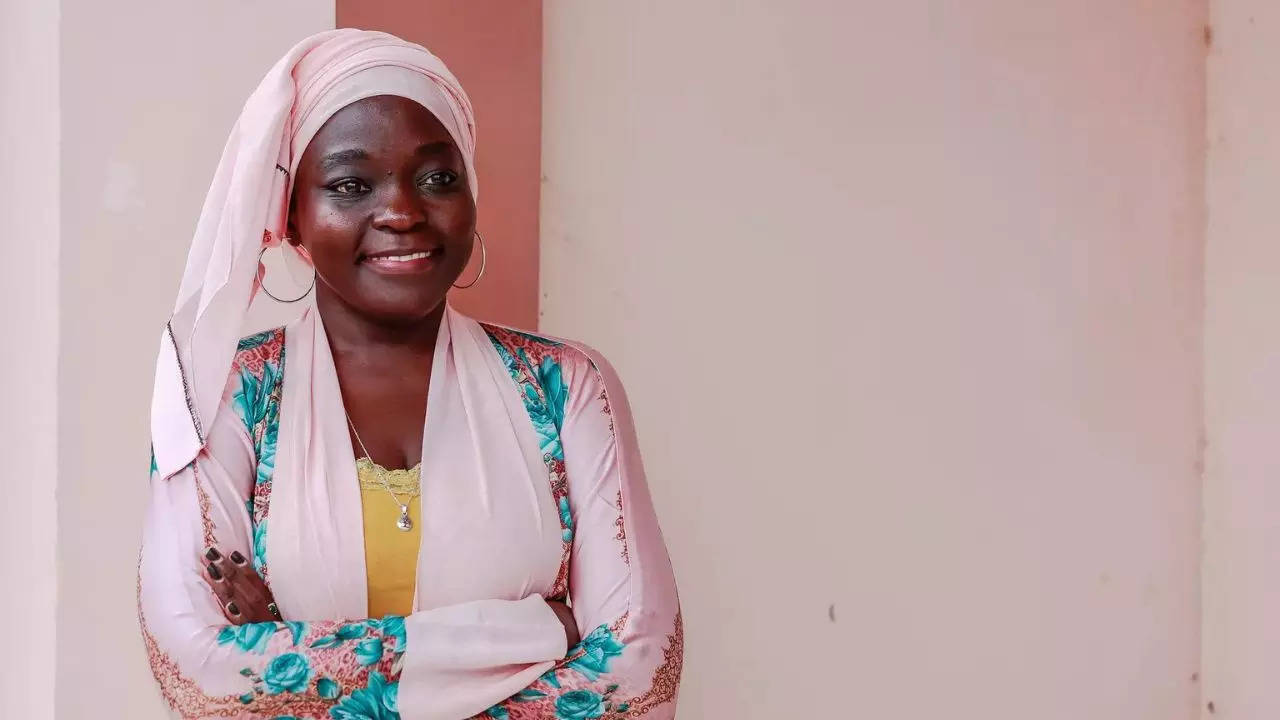[ad_1]
YAOUNDE: In Cameroon’s rural north, only a few women go on to get pleasure from careers in science. Sabine Adeline Fanta Yadang, a neuroscience physician, and Hadidjatou Dairou, PhD pupil of mobile physiology, have overcome prejudice and smashed via the glass ceiling.
They’ve been recognised for the standard of their analysis, together with 28 others from sub-Saharan Africa, by the L’Oreal-Unesco for Girls in Science Younger Abilities programme.
Unesco says the programme helps “younger girls researchers world wide to pursue scientific careers at dwelling or overseas”.
Each girls have been distinguished for his or her analysis into the potential of Cameroon’s conventional natural medicines within the remedy of coronary heart illness and Alzheimer’s.
They work in a laboratory at Yaounde’s Institute for Medical Analysis and Medicinal Plant Research (IMPM).
Within the lab, Dairou is rigorously emptying the contents of a pipette right into a Petri dish.
Beneath her white coat she proudly wears a conventional African costume.
Dairou’s curiosity in natural medication goes again to her years as a pharmacology pupil on the public College of Ngaoundere, within the nation’s north.
“I’ve seen what a plant extract does to the human physique and the way that may assist folks I do know,” she says.
The Unesco programme picked out her analysis into the “potential of the indigenous Garcinia Kola plant for remedy of heart problems”.
Overcoming office discrimination
Fanta Yadang is injecting samples into take a look at tubes earlier than placing them in a centrifuge.
She likes to be often called a Moundang, a group from Cameroon’s Far North area, the place her grand-parents took natural cures.
“I needed to turn out to be a health care provider, however I did not get ok marks. I needed to assist my fellow folks so I grew to become focused on medicinal vegetation,” she says.
“In a area the place women are usually not inspired to go to high school, she stood up in opposition to stereotypes and overcame office discrimination,” in accordance with UNESCO.
The November 8 awards famous she was “in search of to higher perceive the physiopathologies of neuro-degenerative illness, specifically Alzheimer’s, with a view to discover a new remedy supply from medicinal vegetation”.
Domestically, conventional African medication is seen as a separate well being sector.
“In Cameroon, sufferers flip to vegetation earlier than going to hospital,” says Eric Owoundi Nkoa, a natural therapist and secretary on the ministry of Arts and Tradition’s medication centre.
He believes 70-80 % of Cameronians take “pure medication”.
For Dairou, the bark of the bitter Garcinia Kola — a grain that appears like a nut eaten throughout Africa to ease all types of issues — might enhance cardiovascular well being.
“Specifically atherosclerosis, one of many main causes of coronary heart assaults,” she defined.
Fanta Yadang is engaged on tiger nut milk, which is extensively consumed in central Africa. It’s extracted from a plant that has for hundreds of years been reputed for its medicinal powers.
With the price of trendy medicine for Alzheimer’s prohibitive, she intends to show that the plant extract will allow sufferers “to battle neurone degeneration and scale back stress on the mind”.
Way forward for Africa
Solely 13 % of women have been enrolled in tertiary training, the UN academic organisation UNESCO mentioned in 2018.
“Within the north, the place it’s mentioned women do not go far sufficient with their research, I’ve actually demonstrated the opposite,” famous Fanta Yadang.
When she needed to stability her research with having a child, virtually 10 years in the past, her household gave her the power to plough on.
“My father is a nurse and my mom a mid-wife. They used to inform us to check to turn out to be somebody,” she recalled.
Dairou’s father, a vet, pushed her to check for a doctorate.
“That included when sure folks thought the trail was too lengthy,” she mentioned.
“For a lot of, a girl doesn’t want it to deal with her dwelling and dangers not being submissive.”
With the ten,000-euro and 15,000-euro grants from the Unesco awards, Dairou intends to finish her thesis and Fanta Yadang desires to pursue her research at Nigeria’s Ibadan College.
“The way forward for Africa is within the arms of its scientists,” mentioned Fanta Yadang.
They’ve been recognised for the standard of their analysis, together with 28 others from sub-Saharan Africa, by the L’Oreal-Unesco for Girls in Science Younger Abilities programme.
Unesco says the programme helps “younger girls researchers world wide to pursue scientific careers at dwelling or overseas”.
Each girls have been distinguished for his or her analysis into the potential of Cameroon’s conventional natural medicines within the remedy of coronary heart illness and Alzheimer’s.
They work in a laboratory at Yaounde’s Institute for Medical Analysis and Medicinal Plant Research (IMPM).
Within the lab, Dairou is rigorously emptying the contents of a pipette right into a Petri dish.
Beneath her white coat she proudly wears a conventional African costume.
Dairou’s curiosity in natural medication goes again to her years as a pharmacology pupil on the public College of Ngaoundere, within the nation’s north.
“I’ve seen what a plant extract does to the human physique and the way that may assist folks I do know,” she says.
The Unesco programme picked out her analysis into the “potential of the indigenous Garcinia Kola plant for remedy of heart problems”.
Overcoming office discrimination
Fanta Yadang is injecting samples into take a look at tubes earlier than placing them in a centrifuge.
She likes to be often called a Moundang, a group from Cameroon’s Far North area, the place her grand-parents took natural cures.
“I needed to turn out to be a health care provider, however I did not get ok marks. I needed to assist my fellow folks so I grew to become focused on medicinal vegetation,” she says.
“In a area the place women are usually not inspired to go to high school, she stood up in opposition to stereotypes and overcame office discrimination,” in accordance with UNESCO.
The November 8 awards famous she was “in search of to higher perceive the physiopathologies of neuro-degenerative illness, specifically Alzheimer’s, with a view to discover a new remedy supply from medicinal vegetation”.
Domestically, conventional African medication is seen as a separate well being sector.
“In Cameroon, sufferers flip to vegetation earlier than going to hospital,” says Eric Owoundi Nkoa, a natural therapist and secretary on the ministry of Arts and Tradition’s medication centre.
He believes 70-80 % of Cameronians take “pure medication”.
For Dairou, the bark of the bitter Garcinia Kola — a grain that appears like a nut eaten throughout Africa to ease all types of issues — might enhance cardiovascular well being.
“Specifically atherosclerosis, one of many main causes of coronary heart assaults,” she defined.
Fanta Yadang is engaged on tiger nut milk, which is extensively consumed in central Africa. It’s extracted from a plant that has for hundreds of years been reputed for its medicinal powers.
With the price of trendy medicine for Alzheimer’s prohibitive, she intends to show that the plant extract will allow sufferers “to battle neurone degeneration and scale back stress on the mind”.
Way forward for Africa
Solely 13 % of women have been enrolled in tertiary training, the UN academic organisation UNESCO mentioned in 2018.
“Within the north, the place it’s mentioned women do not go far sufficient with their research, I’ve actually demonstrated the opposite,” famous Fanta Yadang.
When she needed to stability her research with having a child, virtually 10 years in the past, her household gave her the power to plough on.
“My father is a nurse and my mom a mid-wife. They used to inform us to check to turn out to be somebody,” she recalled.
Dairou’s father, a vet, pushed her to check for a doctorate.
“That included when sure folks thought the trail was too lengthy,” she mentioned.
“For a lot of, a girl doesn’t want it to deal with her dwelling and dangers not being submissive.”
With the ten,000-euro and 15,000-euro grants from the Unesco awards, Dairou intends to finish her thesis and Fanta Yadang desires to pursue her research at Nigeria’s Ibadan College.
“The way forward for Africa is within the arms of its scientists,” mentioned Fanta Yadang.
[ad_2]



